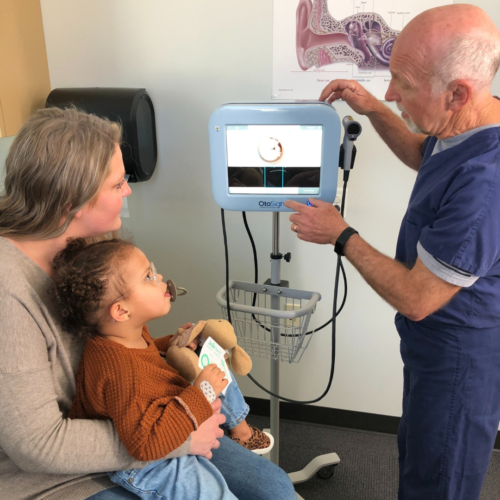Phone
866-411-EARS
Address
PhotoniCare Inc.
2800 Meridian Parkway, Suite 175
Durham, NC 27713

Ready to hear something painfully obvious? Your hearing is vitally important. As simple of an idea as that seems, many people do not know how to properly protect the health of their ears. Once a person’s hearing is damaged, there is no way to repair it and the condition may worsen over time. While there are plenty of ways to fend off hearing loss, we want to highlight five ways to protect ear health.
Turn the Volume Down
The World Health Organization conducted a study and the findings are staggering. They found that 1.1 billion teenagers and young adults face hearing loss dangers from unsafe use of audio devices. This tip is incredibly important for parents of young children. A good practice to follow is listening to their music at 60% volume for no longer than an hour. This will help protect their ears from suffering damage from music that is too loud. Also, if you are looking into buying your child or children an audio device, try going for the over-the-ear headphones. Earbuds are fitted directly next to the eardrum and can have the most negative impact on hearing.
Don’t be Afraid of Using Earplugs
Everyone has been in the following situation: you’re out with your friends at the club or at a concert and the music is bumping and there’s a lot of loud conversations happening all around you, so much so that you feel that you need to yell at the person next to you just so he or she can hear what you’re trying to say. This is a prime situation where earplugs could and should be utilized. Nearly 15% of Americans have experienced some type of loud work or leisure environment that has caused noise-induced hearing loss. Earplugs are affordable and easy to find, leaving you no excuse not to go get some and start protecting your hearing.
Avoid Cotton Swabs
How many of you have ever used a cotton swab to clean out your ear, specifically when removing excess wax buildup? Using a cotton swab to clean your ears is a common practice, however, it may not be the best practice. What people don’t often know is a person’s ears are self-cleaning and ear wax acts as a barrier for dust and other harmful particles to enter the ear canal. Whenever you insert anything into your ears, you run the risk of damaging sensitive structures, like the eardrum. It may be wise to seek professional help for cleaning if you feel that there is an excessive amount of wax that needs cleared.
Keep your Ears Dry
While this tip is important for everyone, this is specifically catered to those taking care of their children. When water gets trapped in the ear, it sometimes leads to an infection in the outer ear. This is called otitis externa, or more commonly known as swimmer’s ear. During the summer months specifically, your children are going to want to be in the pool. It is imperative to make sure they are properly drying their ears after each dip in the pool to avoid early hearing loss issues. Watch and make sure that their ears are gently towel-dried. If they still feel some water inside the ear canal, have them tilt their head and give a light pull on the ear lobe.
RELAX
Here’s a surprising fact: Stress and anxiety are both linked to temporary and permanent tinnitus – the phantom ringing noise in your ears. When a person is feeling particularly stressed, the body can go into the fight or flight mode and your body becomes filled with adrenaline. This puts immense pressure on your nerves and spikes your blood flow and body temperature. This pressure and stress can then travel its way through the body and up into the inner ear, causing the tinnitus symptoms. While we know it’s impossible to simply cut stress out of your life, try to make a conscious effort to regularly put yourself in less stressful situations and environments to provide some balance. This is not only good for your ears and hearing, but also your overall health.
Protecting your ear health is imperative for your hearing. Many times, people don’t even know they are putting stress on their hearing until it’s too late. Following these five steps can certainly put you on the right track to having healthy ears and maintaining your hearing, but that doesn’t mean you can just stop there. Make sure to regularly visit your primary care doctor for check-ups to always keep up-to-date on your ear health. Don’t wait to act until it’s too late. Be proactive and take control of your ear health.

The COVID-19 pandemic has created numerous challenges for parents. Navigating… Read More

PhotoniCare sits down with Dr. Michael Novak, an Ear, Nose… Read More

This week on the #EnginEarGuys blog we talk about otolaryngology… Read More